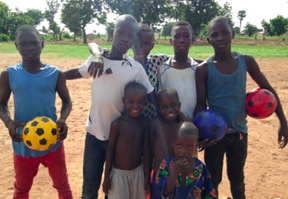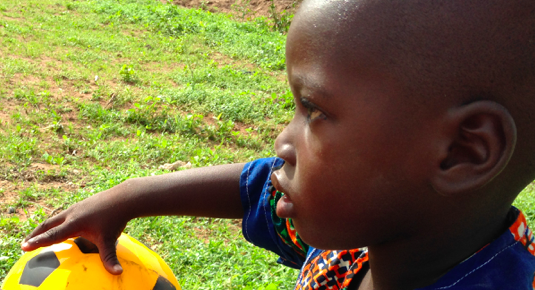fútbol, fútbol, fútbol: what ten Togolese boys taught me about joy
My patient died on Thursday night. (If you missed that story, you can read it here.) On Friday, I was in clinic for the morning, and then I had the afternoon off.
In the early evening, I did what I always do when I need to clear my head and talk to God — I took a walk.
I walked down the main dirt road that leads from the hospital into town (it’s about a mile-long walk.)
Half way between the hospital and the town, there’s a large tree along the side of the road, and I noticed three boys squatting around a small fire they’d built under the tree.
It had been 90 degrees that day, and now, it had “cooled down” to 85.
“Are you cold!?” I asked the boys in French, pointing to the fire.
The oldest boy, who looked about 12, shook his head.
“Are you bored?” I asked.
The middle boy, who looked about 8, nodded his head.
“You don’t have anything to do?” I asked.
All three of them shook their head, and I remembered that school is out for the summer, and won’t resume for two months.
“What do you like to do?” I asked them.
The littlest boy, about 5 years old, jumped up and started running around, kicking an imaginary ball. “Futbol! Futbol! Futbol!” he yelled.
“You want to play futbol with us?” the oldest boy asked.
“Sure,” I said, imagining how embarrassed my athletic brothers would be if they knew their unathletic sister was about to play sports in public. “Where’s your ball?”
“We don’t have one,” the 8-year-old said.
I laughed. They were not only inviting me to play with them, they were also “inviting” me to provide them with a soccer ball.
The sun was setting and I had to be back at the hospital for dinner.
“I don’t have time today,” I said. “But can I come back tomorrow?”
They nodded.
Two other little boys swung down from the tree overhead. “Tomorrow?” they asked in unison.
“Yes,” I said. “I’ll come back tomorrow morning at 8.”
“Eight,” the oldest boy confirmed.
I nodded.
He took a stick, traced the number 8 in the sand, pointed to it, and said again, “Eight.”
“Yes,” I said. “I promise I will come back tomorrow at 8.”
The following morning I went to the market and bought the only soccer balls I could find, which were 12-inch rubber balls with soccer ball markings printed on them.

Ten boys were waiting for me under the tree where they’d been making a fire the night before. When they saw me coming down the road toward them, they began waving their arms and calling, “Sarah! Sarah!” As if I could miss them.
They took the balls and led me to a rectangular dirt soccer field with one lone goal made of tree branches. There was a cement school building on one of the long sides of the rectangle that faced a cornfield on the other side. There were small clusters of thatched mud houses behind both of the goal lines.
The boys divided themselves into two groups. The older boys took one of the balls and played at the half of the soccer field that had the goal post. The younger boys took the other ball and played at the other end of the field.
I noticed a 4-year-old boy sitting on the sidelines, holding the third ball, too intimidated to play with the other kids.

I sat down next to him and put my hand on his shoulder. He scooted a few inches closer to me. We sat there together, watching the boys running around, kicking the balls, yelling with joy, doing cartwheels and backflips, occasionally stopping to wave at me.
I brushed away tears as I let the weight of the past 36 hours sink in. I let the frustration and grief of losing a patient wash over me. I acknowledged that death and grief and pain are inevitable in life — especially life here in rural Africa, where disease is rampant and resources are limited.
And then I took a deep breath and smiled as I let the simple joy of these boys well up inside of me.
I realized that joy does not arise because sadness is absent. Joy arises because in the midst of sadness, hope reminds us that that night, no matter how long or how dark, always gives way to morning.